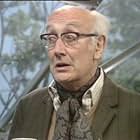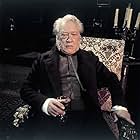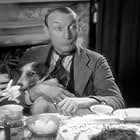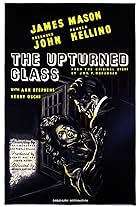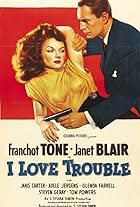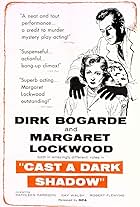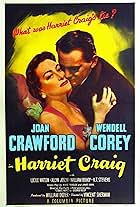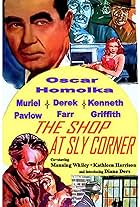Ajouter une intrigue dans votre langueA wife whose goal is power begins a game of manipulation that insidiously destroys her family.A wife whose goal is power begins a game of manipulation that insidiously destroys her family.A wife whose goal is power begins a game of manipulation that insidiously destroys her family.
Photos
Scott Forbes
- Dr. Valentine Christie
- (as Julian Dallas)
Gus McNaughton
- Vet Surgeon
- (uncredited)
Avis en vedette
I read recently that Sonia Dresdel made a great ' Hedda Gabler ' on stage, and I can believe it but sadly her films fell far short of that achievement. She fell into the trashy cinematic trap that a lot of 1940's melodrama's fell into; the fundamentally evil woman. In this example she is a woman seeking power and perhaps a better sexual life than she has been having. She reads ' Lady Chatterley's Lover ' and of course in the 1940's this was a forbidden book that only the depraved read and brought over from France. Absurdly she gives it to her female ' servant ' so as to lure her son in law away from his wife. Tellingly her Doctor son considers male sexuality to be ' aggressive ' and inferred in this that it was the natural order of things. Certainly if you want to see a portrait of a repressive and class obsessed UK during this period of cinema then this film is a film to see. Slowly and painfully in society we have hopefully evolved a little from this. Inevitably she kills her husband's dog and on a destructive bent seeks to destroy those around her. Dresdel seemed to enjoy the role as she also played it on stage, and no doubt this was what the public of the time wanted from her. I give this a 4 as the acting and direction is good but the ending was sickening and no doubt again pleasing to the public. Of sociological interest only and for those who still believe we are ' born ' evil.
Sonia Dresdel is the wife of Walter Fitzgerald and the mother of Barbara White and Doctor Emrys Jones. She's one of those women who dominate everything about the house. When Miss White gets married to Scott Forbes, she's mildly incredulous; it soon becomes apparent to the audience that she is trying to cause a rift between the two of them. As for the others in her family, well, she has plans for them all.
Tim Whelan directs this Queen Bee movie well enough, but the score by Mischa Spoliansky is way over the top, informing the audience that something really important is going on, even at the movie's most banal moments. It's a horrid score that mickey-mouses every plot twist -- not that there are many once you understand the basic thesis that Miss Dresdel is going to get her own way, even when it makes no sense at all. Perhaps without this score, it might have been an interesting melodrama, but with it, it's almost laughable.... or would be if didn't go on for one hundred minutes.
Tim Whelan directs this Queen Bee movie well enough, but the score by Mischa Spoliansky is way over the top, informing the audience that something really important is going on, even at the movie's most banal moments. It's a horrid score that mickey-mouses every plot twist -- not that there are many once you understand the basic thesis that Miss Dresdel is going to get her own way, even when it makes no sense at all. Perhaps without this score, it might have been an interesting melodrama, but with it, it's almost laughable.... or would be if didn't go on for one hundred minutes.
Sonia Dresdel goes Joan Crawford in Queen Bee one better in This Was A Woman, a British film from 1948.
Dresdel was considered one of Britain's finest actresses, and there was widespread disappointment that she never played Lady Macbeth. That's just to give you a heads up of what's coming.
Dresdel plays the matriarch of a home, with a husband, a son, and a daughter. She does horrific things to all of them.
Her mild-mannered husband has prize roses- which she cuts and puts around the house. He has a beloved dog. The minute I saw him, I knew he was doomed. She doesn't like his barking and has him put down.
Her daughter is engaged to be married. Her mother brings a young maid into the house to give him slutty books, hoping she'll make a play for the fiancé.
Then she scares her daughter about sex so horribly that she won't even let her new husband kiss her. The maid starts looking pretty good.
Finally, she meets a successful friend of her husband and decides hubby has to go.
Outrageous. It's not like no one stands up to her, but they don't seem to hold a grudge. In the next scene, everything seems fine.
A tour de force for Dresdel. She's hateful. Must be seen to be believed.
Dresdel was considered one of Britain's finest actresses, and there was widespread disappointment that she never played Lady Macbeth. That's just to give you a heads up of what's coming.
Dresdel plays the matriarch of a home, with a husband, a son, and a daughter. She does horrific things to all of them.
Her mild-mannered husband has prize roses- which she cuts and puts around the house. He has a beloved dog. The minute I saw him, I knew he was doomed. She doesn't like his barking and has him put down.
Her daughter is engaged to be married. Her mother brings a young maid into the house to give him slutty books, hoping she'll make a play for the fiancé.
Then she scares her daughter about sex so horribly that she won't even let her new husband kiss her. The maid starts looking pretty good.
Finally, she meets a successful friend of her husband and decides hubby has to go.
Outrageous. It's not like no one stands up to her, but they don't seem to hold a grudge. In the next scene, everything seems fine.
A tour de force for Dresdel. She's hateful. Must be seen to be believed.
(1948) This Was A Woman
PSYCHOLOGICAL THRILLER
Adapted from the play by Joan Morgan that showcases the Russell family of Sylvia Russell (Sonia Dresdel) her husband, Arthur Russell (Walter Fitzgerald; their adult son, Terry Russell (Emrys Jones) who is close to be a certified doctor and the adult daughter, Fenella Russell (Barbara White) who is already in love with Terry's best friend, Dr. Valentine Christie (Julian Dallas) who happens to be a biochemist. One day the family housekeeper, Mrs. Holmes (Marjorie Rhodes) decides she needs to take some time off to visit relatives and that she is leaving her 22 year old daughter, Effie (Celia Lipton) to take her place. And one of the first anti social examples the mother, Sylvia does is take their beloved family dog, Ace to a veterinary clinic and pay it to put it to sleep. And then as soon as the daughter, Fen announces her engagement to Terry's best friend, Valentine, Sylvia then tries to fill her head with paranoid thoughts. At the same time offer him to live with them after their marriage at the same time. And because the new housekeeper, Effie is single, Sylvia would then try to manipulate both Valentine and her together just so the daughter would have so much distrust with her new husband who does not give him any affection.
I was able to watch it straight through as the rest of the family had been tolerant of the mother's unethical and strange practices. And while I was watching it I could not forget about another movie that consists to have a somewhat similar scenario called "The Little Foxes" directed by William Wyler with the difference is that the time periods are different. Also, the mother Sylvia is a little more ruthless with the hero, Terry refusing to fall for his mother's lies, excuses and manipulation.
Adapted from the play by Joan Morgan that showcases the Russell family of Sylvia Russell (Sonia Dresdel) her husband, Arthur Russell (Walter Fitzgerald; their adult son, Terry Russell (Emrys Jones) who is close to be a certified doctor and the adult daughter, Fenella Russell (Barbara White) who is already in love with Terry's best friend, Dr. Valentine Christie (Julian Dallas) who happens to be a biochemist. One day the family housekeeper, Mrs. Holmes (Marjorie Rhodes) decides she needs to take some time off to visit relatives and that she is leaving her 22 year old daughter, Effie (Celia Lipton) to take her place. And one of the first anti social examples the mother, Sylvia does is take their beloved family dog, Ace to a veterinary clinic and pay it to put it to sleep. And then as soon as the daughter, Fen announces her engagement to Terry's best friend, Valentine, Sylvia then tries to fill her head with paranoid thoughts. At the same time offer him to live with them after their marriage at the same time. And because the new housekeeper, Effie is single, Sylvia would then try to manipulate both Valentine and her together just so the daughter would have so much distrust with her new husband who does not give him any affection.
I was able to watch it straight through as the rest of the family had been tolerant of the mother's unethical and strange practices. And while I was watching it I could not forget about another movie that consists to have a somewhat similar scenario called "The Little Foxes" directed by William Wyler with the difference is that the time periods are different. Also, the mother Sylvia is a little more ruthless with the hero, Terry refusing to fall for his mother's lies, excuses and manipulation.
The formidable Sonia Dresdel reprises her stage role as the monstrous Sylvia Russell, manipulative, sadistic, and finally murderous. Venerating power and success, she demoralizes her husband and schemes to break up her daughter's marriage, though it is not altogether clear as to what she stands to gain from the latter act. In the course of this she attempts to corrupt the maid, including lending her an under-the-counter edition of Lady Chatterley's Lover, then banned in Britain though available in English versions from France, and quite possible to get hold of if you had the money. (Had the prosecutor in the later obscenity trial, who famously asked the jury whether they would be happy if their wives or servants read it, watched this by any chance?). There is also a suggestion of lesbianism as Sylvia strokes the maid's hair, telling her how beautiful she is.
Though some these days could no doubt advance other explanations for Sylvia's behaviour, the original play opened in 1944, and with her cruelty and belief that the ends justify the means, she was surely intended as an embodiment of those evils we were supposedly fighting. It had been written by Joan Morgan, another remarkable woman, an actress in silent films turned playwright who lived on into the present century. In common with several other British films from this period, including Compton Bennett's Daybreak, and Lawrence Huntington's The Upturned Glass, there is a very dark and pessimistic outlook on human nature, reflecting a general mood of despair at recent revelations to the depths to which humanity could sink. Though there is some hope, in that Sylvia's nemesis comes partially through her son, whom has inherited something of her iron will, and as doctor will be caring for rather than destroying others.
The film's main weakness is the lack of any explanation of why Sylvia's poisonous character has never manifested itself previously during all those years she had been bringing up the family. There is no sign of rationing and few people post-war could afford servants so it is presumably set in the late Thirties. It does remain fairly theatrical, though this enables a great power and tension to build in the final scenes. And some of the acting from the younger members of the cast is remarkably feeble. Nevertheless, this is another British film of its time that deserves to be much better known. Not always an easy watch for dog lovers though.
Though some these days could no doubt advance other explanations for Sylvia's behaviour, the original play opened in 1944, and with her cruelty and belief that the ends justify the means, she was surely intended as an embodiment of those evils we were supposedly fighting. It had been written by Joan Morgan, another remarkable woman, an actress in silent films turned playwright who lived on into the present century. In common with several other British films from this period, including Compton Bennett's Daybreak, and Lawrence Huntington's The Upturned Glass, there is a very dark and pessimistic outlook on human nature, reflecting a general mood of despair at recent revelations to the depths to which humanity could sink. Though there is some hope, in that Sylvia's nemesis comes partially through her son, whom has inherited something of her iron will, and as doctor will be caring for rather than destroying others.
The film's main weakness is the lack of any explanation of why Sylvia's poisonous character has never manifested itself previously during all those years she had been bringing up the family. There is no sign of rationing and few people post-war could afford servants so it is presumably set in the late Thirties. It does remain fairly theatrical, though this enables a great power and tension to build in the final scenes. And some of the acting from the younger members of the cast is remarkably feeble. Nevertheless, this is another British film of its time that deserves to be much better known. Not always an easy watch for dog lovers though.
Le saviez-vous
- AnecdotesCelia Lipton's debut.
- GaffesAt about 16:00 as Mrs. Russell is taking the dog to the vet, the shadows of the cameraman is at bottom left.
- Citations
Sylvia Russell: Fenella is not meant for marriage - she's too sensitive, too highly strung, hysterical almost. When she fell in love with you I hoped she'd alter. But if anything, marriage has intensified her abnormality.
- Générique farfeluThe listing of the actors' names in the opening credits ends with "etc, etc".
- ConnexionsReferenced in Ken Adam: Designing Bond (2000)
Meilleurs choix
Connectez-vous pour évaluer et surveiller les recommandations personnalisées
- How long is This Was a Woman?Propulsé par Alexa
Détails
- Durée1 heure 42 minutes
- Couleur
- Rapport de forme
- 1.37 : 1
Contribuer à cette page
Suggérer une modification ou ajouter du contenu manquant

Lacune principale
By what name was This Was a Woman (1948) officially released in Canada in English?
Répondre






